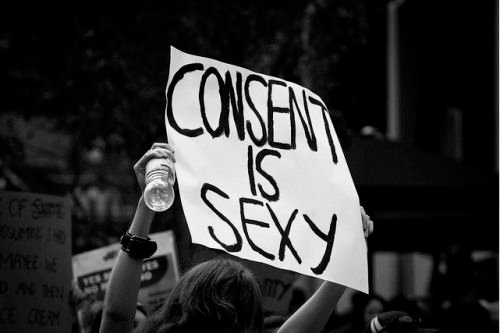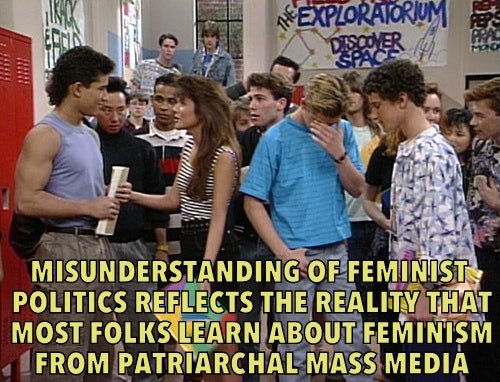
Content warning: this essay discusses rape and the dynamics of Rape Culture.
2017 was a big year for women! From the historic Women’s March on Washington in the very first month (easily the largest demonstration since the anti-Vietnam era, if not the largest ever due to its national and international connections) through the Times Up and Me Too movements that shook up entire industries and had cis/het men the world over shitting their collective pants all the way to the very last month and beyond, I’ve been blown away by the womens’ movement.
And yet there’s oh so much work left to be done, due in no small part to the persistence of Patriarchy and one of its most foul tools, Rape Culture. Thankfully, there’s an antidote to Rape Culture that’s been building power for some time now. That antidote is Consent Culture.
Before we get into the details of Consent Culture and why I think it’s so wonderful, it’s important to lay out some of the ways in which Rape Culture operates. As I mean it in this essay, Rape Culture is a pattern of behavior that transcends boundaries such as race, class, gender, and even (if not especially) nation-states; it is a fundamental disregard for the autonomy and desire of others, coupled with the relentless pursuit of one’s own wants, regardless of cost.
One of the most obvious examples of Rape Culture would be rape itself, as indicated by the name of the issue at hand. Nobody ever wants to be raped by definition, and if we truly respected each others’ autonomy and desire, nobody ever would be raped. Regardless of the details, in every instance of rape, there is a point in which a decision is made by the rapist that their victim’s autonomy and desire doesn’t matter; the fact that they are an independent human being who deserves to be left the fuck alone, ESPECIALLY in situations and manners they very clearly have no interest in, is consciously thrown out the window; and, critically, action is taken in connection to this dehumanizing decision that further violates the victim’s autonomy and desire.
Rape is a terrible fucking thing, point blank period. It is far more terrible than the dynamics that characterize it, and far more terrible than this essay could ever do justice. However, the point of this essay is not to center rape, but instead to discuss the ways in which it can be prevented, and further, the ways in which Rape Culture can be dismantled. Consent Culture, at its most basic, is the antithesis of Rape Culture. Unlike rape and Rape Culture, which very actively disregard difference and pleasure, Consent Culture centers both of these things as guiding virtues in our interactions. It reiterates respect for the autonomy of other people, and makes room for and normalizes the fact that different people often want different things.
Despite its somewhat loaded and legalistic connotations, the word “consent” simply means that we should discuss our differences in desire and reach an agreement before action is taken, especially if that action has anything to do whatsoever with another person’s autonomy, bodily or otherwise.
Consider the case of rape: do you want to have sex with another person? Clearly, this situation involves another person, else it wouldn’t be sex—do they also want to have sex with you? How do you know? Are you sure? And, most critically, if they do not want to have sex with you, that’s it. The end. Situation over. In Consent Culture, under no circumstances would anyone ever make the decision made by the rapist, to disregard the autonomy and desire of another person in order to assert their own will and desire. Consent Culture is in this way very literally the opposite of Rape Culture.
In addition to being common fucking courtesy and also preventing the abomination that is rape, Consent Culture has even more wonderful reasons you should practice and promote it! As mentioned above, Consent Culture centers pleasure, and there’s a strong argument to be made that it even enhances it.
![]()
Forgive me this one nerdy detour—I assure you I have a point and will be brief in chasing it. You see, there’s this school of thought called Utilitarianism, which basically says that happiness is a good thing, such that more happiness is a better thing, and it is right and good therefore to do what we can do in order to maximize happiness.
Pretty uncontroversial, right? (the extremely nerdy Utilitarians go so far as to attempt to quantify and operationalize this rather basic idea—they call their science the “eudaimonic calculus,” if you care to get REALLY nerdy about it). For the Utilitarians who practice Consent Culture, it’s great when someone says, “yes, I would like to do this thing with you,” but it’s also the bare fucking minimum qualification for human interaction. What’s even better than yes is VERY YES, which is known within Consent Culture as emphatic consent—it’s even better to do things with people that they really want to do, rather than just kinda sorta don’t care about doing. You don’t even have to be a Utilitarian to see the sense in that, but I think all the fancy esoteric words help this completely commonsense concept pack a bit more persuasive punch.
One last example of the elegant but unstoppable power of consent: apparently at some point in all the fervor of the year that was 2017, some especially reactionary dudes started freaking out that nobody could hug anyone anymore. Clearly it’s not the case that men can’t hug women, whether within Consent Culture or outside of it. Instead, it’s simply the case that if someone isn’t certain that another person wants to be hugged, and or/has confirmed this fact with them, then they should not be hugged! And it doesn’t take some epic act of divination to determine whether or not someone wants to be hugged—at the very least, one could ask! Shit, if the rise of Consent Culture scares some especially sketchy guys into giving up nonconsensual hugs, then the world will be a better place!
At the end of the day, Consent Culture is all about communication and collaboration, and the beauty of it all is that these are things we all are capable of. It may seem daunting to think about a world without rape and Rape Culture, but it also must have been daunting to organize the Women’s March and the Me Too and Times Up movements, and yet look what incredible change they’ve created in the world in only a year! Consent, and by extension Consent Culture, is capable of just as much change, if not more. Because once the rapists are eliminated, so too are the little things, like the unwanted huggers, the telemarketers, the manspreaders and –splainers, as well as the really big things, like the Imperialist White Supremacist Capitalist Heteropatriarchy, as my hero bell hooks names it. Yes, change at either scale can be as simple as consent.
